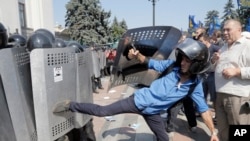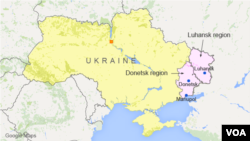Ukraine's President Petro Poroshenko has described as a "stab in the back" a violent nationalist demonstration against legislation that grants more autonomy to pro-Russian separatists in eastern Ukraine.
In a televised address Monday evening, Poroshenko said the protest outside the parliament in Kyiv earlier in the day was "an anti-Ukrainian action for which all organizers, all representatives of political forces without any exception must carry full responsibility."
A Ukrainian security officer was killed and dozens of other law enforcement personnel injured by a grenade allegedly hurled by a protester. Authorities initially said the 25-year-old National Guard officer was shot in the heart and died in a hospital operating room, but Interior Minister Arsen Avakov later said he was killed by a grenade fragment.
Avakov said 122 people, most of them law enforcement officers, were hospitalized with injuries sustained during the violence. Several were reportedly in critical condition.
Avakov blamed the nationalist Svoboda party and its leader, Oleh Tyahnybok, for the violence, and said a Svoboda party member had been taken into custody for throwing the grenade.
Prime Minister Arseniy Yatsenyuk demanded that the perpetrator of the grenade attack be sentenced to life in prison.
A Western-backed peace plan agreed to earlier this year calls for Kyiv to adopt "decentralization" by the end of the year. A total of 265 lawmakers in the 450-seat parliament voted for the changes called for by President Poroshenko, with a final vote set for Tuesday.
‘Un-Ukrainian’
The protesters call the reforms "un-Ukrainian," and said the constitutional changes would effectively legalize the rebels' control of eastern Ukraine, even as the insurgents say the changes do not give them the semi-autonomous status they are seeking.
One of the protesters, recalling Poroshenko's earlier life as a candy company magnate, held a sign saying, "Poroshenko, the country is not a candy; do not split it."
Another protester, Ivan Kirishenko, said, "I have a big question why young patriots in the center, east and west of Ukraine must feed old separatists in Donbas," as the eastern region is known.
Analysts say that even if the bill garners enough votes in its final reading, the rebels, who have complained about not being consulted, are not likely to accept it.
“I do not believe that what has been proposed in Kyiv has any chance of being accepted by the people in Donetsk and Luhansk," said Dmitri Trenin, director of the Carnegie Moscow Center. "I don’t think it will be accepted by the people in Moscow.”
Russia is among the signatories of the so-called Minsk agreement, part of which stipulates greater autonomy for rebel-held regions in Ukraine’s east.
Despite a cease-fire, also agreed to in the February Minsk deal, armed skirmishes between Kyiv's forces and the pro-Russian rebels in Ukraine’s east occur frequently, with each side accusing the other of violating the truce.
The fighting has killed more than 6,800 people over the last 16 months. Clashes erupted in the aftermath of the ouster of Moscow-backed president Viktor Yanukovych, who fled to Russia as a pro-Western government assumed power in Kyiv.
Russia is widely accused in the West of having orchestrated the conflict in retribution for Ukraine's new leaders pursuing policies not aligned with Moscow’s interest, a charge it denies.
VOA's Daniel Schearf contributed to this report from Moscow.







